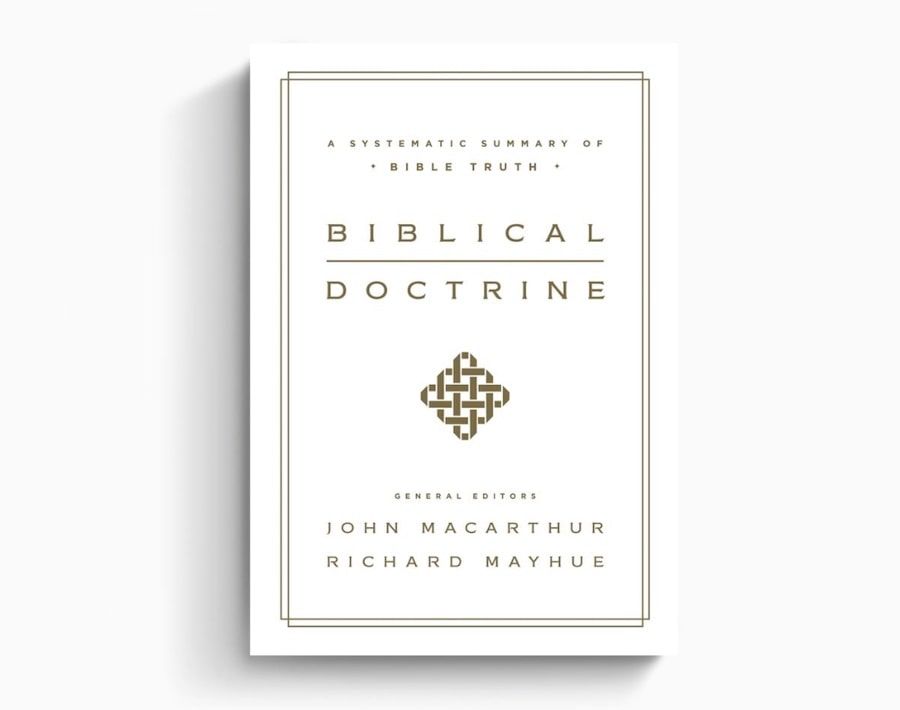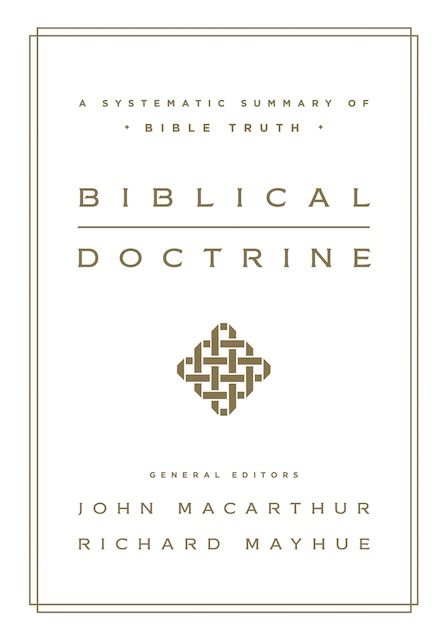Biblical Doctrine
Biblical Doctrine, published by Crossway, is MacArthur and Mayhue’s systematic theology. This is my review, having read through the book in its entirety.

Books written by John MacArthur have profoundly impacted my Christian life. His New Testament commentary series has aided immensely my study of the New Testament. The MacArthur Study Bible remains my preferred daily Bible. His topical books on lordship salvation, charismatic gifts, and leadership have solidified some of my personal convictions.
Biblical Doctrine, published in 2017 by Crossway, is MacArthur’s systematic theology. Like his study Bible, this systematic theology was a project requiring a team of seminary and college professors. But the final product is ultimately the work of John MacArthur and Richard Mayhue. I was eagerly anticipating the publication of this systematic theology, and having read through the entire volume, I was not disappointed.
1. Purpose of Biblical Doctrine
Biblical Doctrine, a Systematic Summary of Biblical Truth, was written as a modern 21st century systematic theology. It intended to address today’s most important theological issues. It defends the attacks on the inerrancy of Scripture, recent creationism, God’s sovereignty in redemption, cessation of miraculous sign gifts, the complementarian view on men and women’s roles, and a “futuristic premillennial” view and God’s future plan for Israel.
The authors’ intent is to provide a comprehensive, biblical summary of biblical doctrine. This book can be used as a textbook in Bible colleges and seminaries. It can be self–studied by pastors and teachers. It can also written for lay people who simply want to learn what the Bible teaches about the most important doctrinl topics.
2. Content of Biblical Doctrine
Chapter 1 is the prolegomena. Instead of starting with an academic explanation on epistemology, Biblical Doctrine’s prolegomena begins the book with a “frequently asked questions” (FAQ) on systematic theology. This first chapter is practical, answering questions like “what is systematic theology” and “why should we study it?”
Chapter 2 covers bibliology, the doctrine of God’s word. Inspiration and inerrancy are covered. The preservation of Scripture and an overview of textual criticism are also covered. The primary goal of chapter 2 is to help readers understand what the Bible states about itself.
Chapter 3 covers theology proper. A presuppositional apologetic is used when discussing the existence of God. The classification of communicable and incommunicable attributes is used when discussing the attributes of God. The doctrine of the trinity is discussed in this chapter, as are the issues relating to creation, miracles, and the problem of evil (theodicy).
Chapter 4 covers Christology, the doctrine of the second person of the trinity. Having just read Stephen Wellum’s volume on Christology, this chapter felt a little compressed. However, I really enjoyed reading MacArthur’s summary on the person of Christ through three perspectives: Christ reincarnate, Christ incarnate, and Christ glorified.
Chapter 5 covers pneumatology, the doctrine of the Holy Spirit. Special attention is placed on affirming the deity of the Spirit and his relationship within the trinity. The rest of the chapter covers the role and ministry of the Holy Spirit. Spiritual gifts are discussed here.
Chapter 6 covers the doctrine of man and sin. Six day creationists will appreciate MacArthur’s discussion of fiat creationism and the importance of Adam as a historical person. This chapter explains the meaning of being “created in God’s image” (imago dei), the constitution of man (dichotomism vs trichotomism), and the origin of the soul. Other anthropology topics discussed include gender and sexuality, the beginning of personhood. MacArthur also summarizes the Bible’s perspective on ethnicity, government, and culture.
The sixth chapter also covers the major topics regarding sin: the origin of sin, the consequences of sin, and the depravity of man. The chapter concludes with an FAQ featuring more challenging questions often posed concerning sin.
Chapter 7 covers soteriology, the doctrine of salvation. The presentation of the doctrines of grace come from a reformed perspective. MacArthur begins with discussing God’s ultimate purpose for salvation. He dedicates a lot of pages covering God’s plan for salvation (His decrees, his unconditional election, and his reprobation). Christ’s atoning work (penal substitution) is explained, as is the limited extent of the atonement. The chapter concludes with a description on the order of salvation: gospel proclamation, regeneration, conversion, union with Christ, justification, adoption, sanctification, perseverance, and glorification.
Chapter 8 covers angelology. Bible passages that help us understand holy angels, Satan, and demons are reviewed. A fuller discussion on the “angel of the Lord” is given, and a handful of common questions are reviewed and answered.
Chapter 9 covers ecclesiology, the doctrine of the church. This chapter is very practical. Instead of academically analyzing the arguments in favor of one type of church polity, MacArthur wrote this chapter as a pastor who is passionate about the universal and local church. MacArthur’s tone in his discussions on church discipline and church membership are very pastoral.
Chapter 10 closes the book with eschatology, the doctrine of the future. After defining the relationship of eschatology with other topics, a synopsis of Bible truths of personal eschatology is first discussed (death, intermediate state, resurrection, heaven and hell). Cosmic eschatology is then explained. An explanation and defense for the “futuristic premillenial” view is given. The distinction between Israel and the church is also defended. The timing of the rapture, the order of resurrection, the future judgment, and a summary of God’s fulfillment of his covenantal promises is then presented. Throughout the chapter, common alternative views are explained.
3. Commentary of Biblical Doctrine
Some of the topics of discussion are organized with subpoints that are alliterated. At times, this systematic theology reads like a topical exposition of Scripture. To me, this feature is a strength. Even if you disagree with the final conclusions of the authors, you have all the most important Scripture references cited for each doctrinal topic.
There is an extended biography at the end of each chapter that will serve pastors and lay people admirably. No discussion questions have been written, but there are personal prayers and hymns that encourage the reader to respond to God in prayer and worship.
MacArthur and Mayhue take special care to define most theological terms. Although a newer Christian may need to exert more effort to read through this theological work, I feel this is one of the most accessible systematic theologies available.
4. Comparison Analysis
One important question to answer is “how does this systematic theology compare to others?”
The most popular evangelical systematic theology used today is Wayne Grudem’s Systematic Theology. For lay people who hold to similar doctrinal conclusions as John MacArthur, Biblical Doctrine was written for you. It is accessible, expositional, and practical. It will help you know why you believe what you believe, and it will help you defend and address the most common alternative views.
If you disagree with a number of MacArthur’s conclusions, this systematic theology loses its luster. Grudem’s systematic theology presents each topic with more balance. Some might view a balanced presentation as a weakness, but it is easier to use Grudem in the classroom setting where doctrinal views may differ.
Unlike some of the more abridged systematic theologies, Biblical Doctrine is very comprehensive. I can quibble where more space should have been dedicated for deeper discussion. But overall, every major doctrinal topic is adequately addressed.
5. Final Thoughts
Overall, John MacArthur and Richard Mayhue prepared this reference work not only as academic theologians but as shepherd pastors. Their intent was to explain the “what and why” of biblical doctrine. If a church wants to study systematic theology and are generally aligned with MacArthur’s conclusion, Biblical Doctrine should be strongly considered. If my wife decided she wanted to read a systematic theology, Biblical Doctrine would be my first recommendation. I don’t expect Biblical Doctrine to displace Wayne Grudem’s Systematic Theology in popularity, but because I do agree with most of MacArthur’s conclusions, it has become my number one systematic theology.

Biblical Doctrine: A Systematic Summary of Bible Truth
by John MacArthur and Richard Mayhue | Crossway (2017)
| Listen on Apple Podcasts | Listen on Google Podcasts |
|---|




